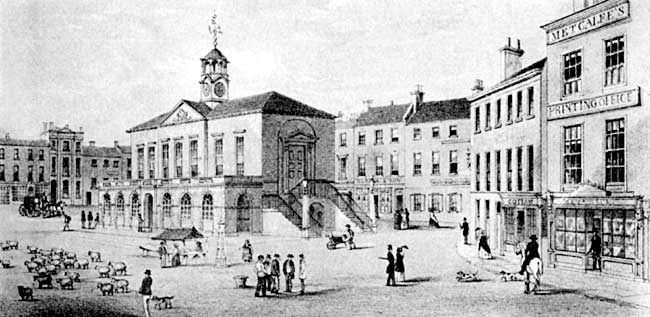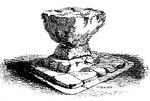ABOUT NOTTINGHAMSHIRE: ITS PLACES AND ITS PEOPLE,
by CORNELIUS BROWN, F.R.S.L., author of "LIVES OF NOTTS. WORTHIES" and
other works.
Chapter XXVIII. Retford and its records
MR. PIERCY AND HIS WORK—A JUSTIFIABLE LAMENT—BATTLE ON THE BANKS OF THE IDLE—EARLY IMPORTANCE OF RETFORD—ROYAL GRANTS AND FAVOURS—RETFORD WORTHIES—A NOTABLE DISPUTE—THE PARISH CHURCH—THE TOWER AND STEEPLE BLOWN DOWN—ENTRIES IN THE STATE PAPERS—AN ARMY AT WHEATLEY—A CURIOUS ELECTION STORY—MODERN EVENTS.

The old town hall, Retford, c.1848.
Rather more than half a century ago, when Mr. Piercy wrote his little history of Retford he took occasion to remark that, "It was greatly to be regretted that while other places had had their historians and draughtsmen, Retford should for centuries have been devoid of both." With such an expression of lamentation it is impossible not to coincide. In the onward march of time old landmarks and venerable buildings have been swept away, and in walking through the streets we meet with little to remind us of that which once has been. The Retford of to-day is a town of modern dwellings, and apart from its parish church there is nothing left to serve as a connecting link between the old and the new. We are glad to see that the town has made such substantial and creditable progress, and that spacious houses and public edifices have given place to ancient and more insignificant structures. But it would have been very interesting to have had preserved for us drawings of the old Moot Hall which was removed early in the last century, and of other venerable places which for many long years the people of Retford were accustomed to use. It is singular that neither Thoroton nor Throsby give any engravings of the borough, and Mr. Piercy could find no local subjects to illustrate his pages except the churches and chapels, the town seal, and the Broadstone (1), the other curiosities which he depicts having come from Scarborough. We must assume, therefore, that pictorial representations are few and far between. The town has not had its draughtsmen, which is matter for lasting regret, but the absence of historians is not so serious a loss. The work of the writer may be taken up at any time, and every year as historic treasures are being calendared and made accessible it becomes possible to make the story of a town more reliable and complete. If we cannot bring to view any sketches of old Retford, we may be able to make some additions to the annals of this important and ancient town.

The Broadstone.
To begin as far back as the period of the Danish invasion, we find mention made by Baeda of a battle on the banks of the river Idle, A.D. 617. The circumstances were these:—"In the year 617 AEthelfrith, the powerful King of Pagan Northumbria, demanded from Raedweald, the half-Christian and half-Pagan King of East Anglia, the surrender of Edwin, the representative of the kingly stock of Doera, or Deira, the southern half of Northumbria, who had found an asylum at AEedweald's court. The East Anglian King, after some hesitation, refused to surrender the fugitive, and, fully appreciating the consequences of this refusal, gathered his forces in haste, and set out to meet the terrible Northumbrian King. Raedweald was so expeditious that he surprised AEthelfrith on the borders of Mercia before the body of his army had come up. Here, on the eastern bank of the river Idle, near Retford, was fought a battle in which the Northumbrian King was defeated and slain(2)." The next reference to Retford or its immediate vicinity that we meet with is in Doomsday Book, and it is unusually brief and insignificant. It mentions that in Retford there was one mill belonging to the fee of Sutton, the property of the Archbishop of York, but it gives no further information of any interest or value. It is evident, however, that the place soon flourished and developed, and that it came to be looked upon as a business centre for the district around. The date of the first charter is not known, but in 1246 Henry III. for "the bettering of his borough of Retford" granted to the burgesses and their heirs one fair annually of eight days, viz., on the eve, the day, and the morrow of Holy Trinity and five days following (3). Other liberties and privileges were given by Henry, and his son, Edward the First, in 1279 granted the town to the burgesses in fee farm, paying for the eame £10 a year. They were to have a market every Saturday, and to have the amendment of the assize of bread and beer, and the pillory and the ducking stool, and wrecks and waifs, and to have a bailiff of themselves. So important had the town become that in the reign of Edward II. (A.D. 1315) it bad the honour of sending representative to Parliament. In 1530 it sought to be excused from exercising this right on the ground of poverty and inability to pay the burgesses the heavy expenses of their long journeys, and the prayer of this petition was granted. But if the town erased of its own volition to exercise its influence in the control of national affairs, two of its sons made their way to the forefront and took no small part in the government of the country. Robert de Retford, son of Richard de Retford, rose to the dignity of a judge, and was summoned to Parliament in that capacity in August, 1295 (4). He continued to be called upon to assist at the deliberations of the senate until 1318, and having left on one occasion without Royal permission he was peremptorily summoned to return and not to absent himself again without the King's licence. His name is entered amongst those present at the coronation in 1308, and there are entries of his acting in his judicial capacity in the home district and in Durham and Leicester. William de Retford, whom we believe to be his son, was appointed Keeper of the Great Wardrobe, and in 1351 made a baron of the Exchequer (5). He is described as "clericus' but it did not follow that he was a clergyman, for the "clerics" of six hundred years ago comprehended all those whom we now call the professional classes. The law of the land was merciless and cruel, hanging men on small provocation, but a cleric was only half amenable to it, and could demand the protection of the church. "As a natural and inevitable consequence of such a privilege accorded to a class, there was a very strong inducement to become a member of that class; and as the church made it easy for any fairly educated man to be admitted, at any rate to the lower orders of the ministry, anyone who preferred a professional career, or desired to give himself up to a life of study, enrolled himself among the 'clerics,' and was henceforth reckoned as belonging to the clergy" (6). Only a small proportion of them ever became ministers of religion, they were lawyers or lawyers clerks, and William de Retford "clericus" was an influential lawyer and a judge.
Shortly after the demise of these Retford worthies the borough became involved in a notable dispute with a powerful neighbour. Sir Thomas de Hercy, one of the lords of the town of West Retford. The Hercys were an old and famous family, and the owners of considerable property in the neighbourhood (7) By a fine (40 Edward III.) between Hugh de Hercy and Alice his wife and Robert de Musters and others, the manors of Grove and Weston, and the advowsons of the churches of Grove, Ordsall, and West Retford were settled on the said Hugh, Alice, and Robert for life, with remainder to Thomas de Hercy and Elizabeth his wife. Thomas on acquiring the property seems to have imbibed an exalted idea of his own position and authority, and to have attempted to rule the roast in a way that the people of Retford did not relish. They therefore brought an action against him (temp. Richard II.), and as was customary in those days, found sureties to satisfy the defendant for costs and damages in case they failed to prove the matter contained in the bill of indictment. As the document is a curious one, and has not heretofore been published locally, we append a translation of it:—
"To our Very Reverend Father in God the Archbishop of York, Chancellor of England, beseech the burgesses and tenants of our Lord the King of East Retford that whereas they, their ancestors and predecessors of the same town since time of memory have used to depasture their beasts in the fields of West Retford, paying to the lords of the said town for every horse, ox, or cow, twopence annually, and for every hog one penny, and for every young pig one halfpenny, and now Thomas de Hercy, Knight, one of the lords of the said town of West Retford, hath levied of the said burgesses double for every beast by extortion [amounting to] more than forty pounds, in defeasance of the right of the King and great impoverishment of the said burgesses, and hath taken this year for their pasture of the said beasts five marks, and doth not permit them to depasture any more without fresh ransom, insomuch that they have lost great part of their said beasts by his default to the damage of the said tenants of one hundred marks.
"Also where the water of the Idel ought and used to have its right course from Ordesale to Bolum, between the town of Retford and the King's mills, there the said Sir Thomas hath stopped the said ancient course at Byggynges in nuisance as well of the said mills as of the said town of East Retford, to the damage of the King of two hundred pounds, &c.
"Also where the said Sir Thomas hath nothing in the said town of East Retford, nor can claim anything of right, he sends his servants called watermen with bows and arrows, and from day to day fishes with force and arms in the common water of East Retford, which the said burgesses hold of the king, and take the nets and fish of the said burgesses which they find there, breaking their houses, and threatening them of life and limb against the king's right and his peace, against his franchise, &c.
(1) The Broadstone is in front of
the Town Hall. It is said that it formerly stood to the south-east of
the town, and that when the plague prevailed the markets were held around
it.
(2) The Early History of Nottingham, by Mr. W. H. Stevenson, p.5.
(3) Throsby's Thoroton, III., 275.
(4) Parliamentary Writs, I., 801.
(5) Foss's Judges, 552.
(6) The Coming of the Friers, by Dr. Jessop, 82.
(7) They were often called upon to render important military services.
In 1517, by a commission dated at Nottingham, Robertus de Strelley, Robertus
Touk, and Hugo de Hercy were empowered to raise 2,000 soldiers, of whom
200 were to be slingers, and to march them to Newcastle. Parl. Writs,
12, 193.
